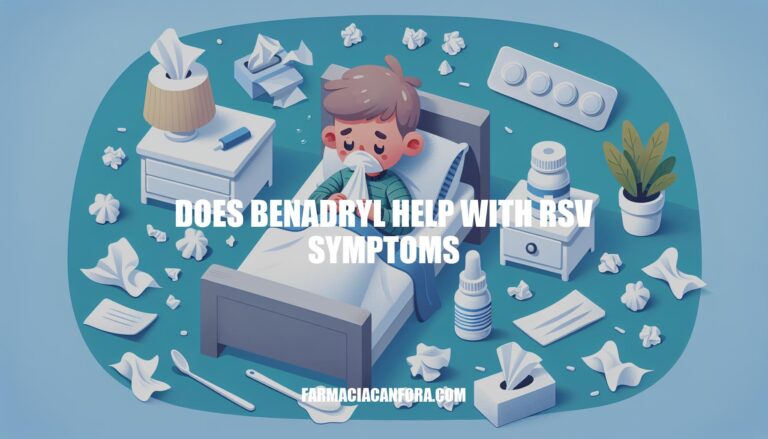


Respiratory syncytial virus (RSV) is a common virus that infects the respiratory tract, causing symptoms similar to a cold, such as a runny nose, cough, and fever. While most cases are mild, RSV can be severe in infants, older adults, and those with weakened immune systems.
People might consider using Benadryl (diphenhydramine) to help with RSV symptoms because it can alleviate some of the discomfort associated with the virus, such as runny nose and congestion. However, it’s important to consult a healthcare provider before using any medication for RSV.
Benadryl, whose active ingredient is diphenhydramine, works as an antihistamine by blocking histamine receptors in the body. Histamine is a chemical released during allergic reactions that causes symptoms like itching, sneezing, and runny nose. By blocking these receptors, Benadryl helps alleviate these symptoms.
Typical uses of Benadryl include treating:
Potential effects on RSV symptoms: Respiratory Syncytial Virus (RSV) primarily affects the respiratory system, causing symptoms like coughing, wheezing, and difficulty breathing. While Benadryl can help reduce nasal congestion and runny nose, it doesn’t directly address the viral infection or more severe respiratory symptoms associated with RSV. Its sedative effects might also help with sleep, which can be beneficial for overall recovery.
If you have any specific concerns about using Benadryl for RSV, it’s best to consult a healthcare professional.
Positive Findings:
Negative Findings:
Here are the potential risks and side effects of using Benadryl (diphenhydramine), especially when treating RSV symptoms:
Common Side Effects:
Serious Side Effects:
Overdose Symptoms:
Special Considerations for RSV:
Always consult a healthcare professional before using Benadryl, especially for treating RSV symptoms.
Common treatments for RSV symptoms include:
Benadryl (Diphenhydramine) is generally not recommended for RSV as it doesn’t address the underlying symptoms effectively. Saline drops and acetaminophen/ibuprofen are more effective for symptom relief, while monoclonal antibodies are preventive.
Benadryl (diphenhydramine) can alleviate some RSV symptoms, such as runny nose and congestion, but it doesn’t address the underlying viral infection or prevent complications like bronchiolitis or pneumonia.
It’s essential to consult a healthcare professional before using Benadryl for RSV symptoms due to potential side effects, especially in young children and older adults.
Common treatments for RSV symptoms include:
Based on the information provided, it’s not recommended to use Benadryl as a primary treatment for RSV symptoms, but rather as an adjunct therapy under medical supervision.